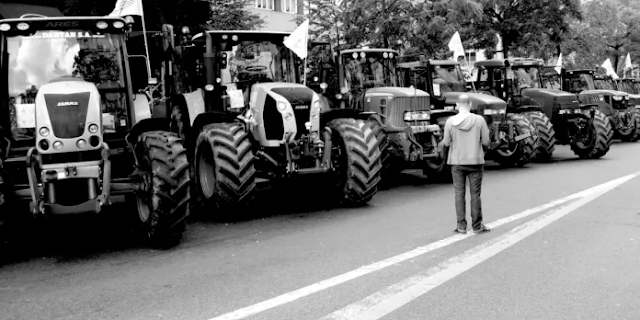Gun police against unarmed farmers – the new siege of Paris
Gun police against unarmed farmers – the new siege of Paris
IN a distant echo of the Franco-Prussian War – this time with tractors rather than cannons – Paris is once more under siege. French farmers have, with military efficiency, cut off the main motorway arteries feeding the heart of the capital. Their message is simple: ‘no farmers = no food’. In 1870, starved of provisions by the German army, Parisians turned to eating rats before going on to devour the occupants of the municipal zoo. If the French farmers’ protest goes on as long as the Prussian military campaign, thanks to Socialist mayor Anne Hidalgo Parisians will once more be put in a position to eat their fill of rodent.
Dark humour aside, this is no joke. It started before Christmas with farmers throughout the country turning road signs upside-down to express their exasperation at how the European Union and its French lackeys have been making life impossible for farmers through a mixture of over-regulation and unfair competition. ‘On marche sur la tête’ (‘we’re walking on our heads’) is the phrase used by these hard-working men and women to describe the absurd, upside-down world of the EU’s biggest agricultural producer.
For example, one of their biggest gripes has been the fact that, European bureaucrats having banned the use of various pesticides and hormones by growers and herders in Europe, farmers are forced to compete with producers from countries where such things are legal. When farmers are then forced out of the market by the regulations, France imports what it used to grow itself; produce containing all the banned chemicals it refuses to allow its own producers to use.
As a result, up and down France for a week, farmers have been blocking motorways in an attempt to get themselves heard by their cloth-eared Brussels-loyal government. While President Emmanuel Macron’s European protégé Pascal Canfin MEP champions synthetic meat with the goal of reducing livestock farming by 15 per cent, smallholders broken by the EU and committing suicide at a rate of one every two days, have had enough of bureaucratic bullying and have taken to their tractors to protest.
They were left hungry and asking for more last Friday when the new Prime Minister Gabriel Attal, perched on a bale of hay on a farm in the south of France, announced a few tweaks to the rules which amounted to ‘simplifying’ (rather than just getting rid of) the red-tape restrictions. He failed to impress his national audience of rural workers gathered around their smartphones. The head of the biggest farming union, the usually ultra-moderate FNSEA, nudged into militancy by its membership, then promised the press that his members would head to Paris and that this week would be ‘full of danger’.
Interior Minister Gérald Darmanin has taken him at his word and mobilised 15,000 police officers and armoured cars to prevent farmers from blocking access to the world’s biggest fresh food market, Rungis, ten miles south of Paris. Though he described the action as ‘defensive’, farmers have naturally been shocked to see military vehicles deployed to stop them protesting. A confrontation between armed police and unarmed tractor drivers is now a real possibility.
This would horrify the 92 per cent of French people who love their farmers with a passion that is hard to appreciate from outside. This is a country in which, every year, the president is virtually obliged to visit the Salon de l’Agriculture to press the flesh with growers and herders, and pat their cattle, in front of the TV cameras. One of its most popular TV programmes is based on the Channel 4 dating show from 2001 Farmer Wants a Wife – a ratings flop in the UK, now in its 18th season in France. The importance of good-quality food is paramount in the home of gastronomie. It’s regularly claimed that most urban families have a grandparent or great-grandparent who was originally a paysan. You don’t pick a political fist fight with what could be, or is, someone’s granddad without thinking very carefully about the possible consequences.
How can Macron’s government get its angry farmers to return to their fields? It’s very hard to say. In an eerie parallel with the start of the Yellow Vest movement, itself triggered in part by an environmental tax on fuel, which quickly turned violent in December 2018, the president is abroad, doing arms deals and arranging student visas with Indians. He has yet to say a single word in public about the meltdown in his homeland. Of course, he and his entire caste have long been wedded to ‘reducing carbon’ with all the pain, misery and anger this brings with it. They are fully on board with the EU’s intended aim to take 10 per cent of agricultural land out of use in the interests of promoting ‘biodiversity’.
The farmers meanwhile are at the end of their tether. They work out of a passion for their land, and simply want to be able to make a living from their hard work. Patronising suggestions of increased state support in the form of a ‘minimum wage’ have been dismissed by those who don’t want to live by handouts. They just want the state off of their backs. They definitely don’t need more bureaucracy to police them and get them filling out more forms to qualify for financial help. Short of rolling back its commitment to ‘sustainable agriculture’ and other eco-nonsense, however, there’s not much else the government is able to offer.
The first siege of Paris lasted four months and ended with a revolution and a massacre. Who knows how this one might finish?
Source: TCW

Comments
Post a Comment